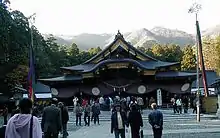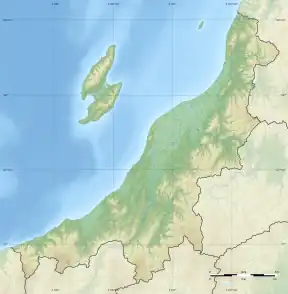Yahiko Shrine
Yahiko jinja (弥彦神社), also known as Iyahiko-jinja is a Shinto shrine in the Yahiko neighborhood of the village of Yahiko, Nishikanbara District, Niigata Prefecture, Japan. It is one of the three shrines which claim the title of ichinomiya of former Echigo Province.[1] The shrine's annual festival is held on February 2.[2] This shrine standing at the foot of a mountain is popularly known as a power spot for love and good fortune[3]
| Yahiko Shrine | |
|---|---|
弥彦神社 | |
 Haiden of Yahiko Jinja
| |
| Religion | |
| Affiliation | Shinto |
| Deity | Ame-no-Kaguyama-no-Mikoto |
| Festival | February 2 |
| Type | Ichinomiya |
| Location | |
| Location | Yahiko, Niigata, Japan |
 Yahiko Jinja  Yahiko Shrine (Japan) | |
| Geographic coordinates | 37°42′23.7″N 138°49′33.9″E |
| Website | |
| Official website | |
The shrine is located within Sado-Yahiko-Yoneyama Quasi-National Park and is on the eastern base of Mount Yahiko,[4] a 634-meter sacred mountain which forms the shintai of the shrine.
History
The foundation date of Yahiko Shrine is unknown, but the shrine dates to prehistoric times as it us referred to as "ancient" in a poem even in the Nara period Man'yōshū. Per the shrine's legend, Ame-no-Kaguyama-no-mikoto landed from the heavens at Nozumihama (in what is now the city of Nagaoka) and taught local people about industries such as fishing, salt production, rice cultivation, and sericulture.[3][5] He was later enshrined on Mount Yahiko as the kami who founded Echigo. He also was recorded in the Kojiki as having performed a bugaku dance at the coronation of Emperor Jimmu. Ame-no-Kaguyama-no-mikoto is also claimed to be the ancestor of the Owari Kuni no miyatsuko and it is more than likely that the shrine legend and tradition confuses this kami with Prince Ohiko (大彦命), the ancestor of the Hokuriku Kuni no miyatsuko.[6]
The shrine is mentioned in and entry for 833 AD in Shoku Nihon Kōki and per the same source, the shrine was awarded the rank of Junior 5th Rank, Lower Grade (従五位下) in 842 AD. Per the Nihon Sandai Jitsuroku, it was promoted to Junior 4th Rank, Lower Grade in 861 AD and its name appears in the Engishiki records compiled in 927 AD. The subsequent history of the shrine is uncertain and often contradictory, as most old records have been lost in fires and other disasters over the years. The shrine was well patronised by the military class, and the shrine treasury has a Muromachi period Ōdachi Japanese sword which is an Important Cultural Property of Japan as well as amor and swords donated by Minamoto no Yoriie, Minamoto no Yoshitsune and Uesugi Kenshin.[7]
During the Edo period, the daimyō of Takada Domain, Matsudaira Tadateru granted the shrine estates with a kokudaka of 500 koku for its upkeep/ During the Edo Period, the kokugaku scholar Hirata Atsutane claimed that the shrine had preserved in Jindai moji, predating the introduction of Chinese-based kanji, but that these records had been lost in a fire.
After the Meiji restoration and the establishment of State Shinto, the shrine was designated a National shrine, 2nd rank (国幣中社, kokuhei-chūsha) under the Modern system of ranked Shinto Shrines in 1871. The present shrine structures were rebuilt in 1916. The earlier shrine buildings were destroyed by a 1912 fire which started in the village.[7]
The shrine is located a 15-minute walk from Yahiko Station o the JR East Yahiko Line.[8]
Gallery
 Mount Yahiko
Mount Yahiko Torii
Torii Tobashira Jinja Shaden
Tobashira Jinja Shaden
Cultural Properties
Important Cultural Properties
- Tobashira Jinja Shaden (十柱神社社殿), Edo Period, completed in 1694. This is a sub-shrine located within the precincts of the Yahiko Jinja with a thatched nagare-zukuri roof. It was designated as a National Important Cultural Property in 1917.[9]
- Ōdachi (大太刀), Muromachi period, dated 1415, blade length of 220.4 cm. [10]
- Tetsu Bussho-bachi (鉄仏餉鉢), Kamakura period, dated 1326[11]
References
- "Nationwide List of Ichinomiya," p. 2; retrieved 2012-3-13.
- Shibuya, Nobuhiro (2015). Shokoku jinja Ichinomiya Ninomiya San'nomiya (in Japanese). Yamakawa shuppansha. ISBN 978-4634150867.
- "About Yahiko Shrine - Niigata Travel Guide | Planetyze". Planetyze. Retrieved 2017-10-14.
- Japan National Tourism Organization (JNTO), "Mt. Yahiko Area"; retrieved 2012-10-24.
- JNTO, "Yahiko-jinja Shrine"; Kotodamaya.com, "Yahiko Jinja"; retrieved 2012-10-24.
- Yoshiki, Emi (2007). Zenkoku 'Ichinomiya' tettei gaido (in Japanese). PHP Institute. ISBN 978-4569669304.
- Yahiko Village website, "Sightseeing Information--Yahiko Shrine" Archived 2016-11-13 at the Wayback Machine; retrieved 2012-10-24.
- Okada, Shoji (2014). Taiyō no chizuchō 24 zenkoku 'Ichinomiya' meguri (in Japanese). Heibonsha. ISBN 978-4582945614.
- "弥彦神社境内末社十柱神社社殿" [Yahiko jinja keidai massha Tobashira Jinja Shaden] (in Japanese). Agency for Cultural Affairs. Retrieved August 20, 2020.
- "大太刀〈銘南無正八幡大菩薩右恵門烝家盛/南無唵麾利支天源定重応永廿二年十二月日〉" [Ōdachi <signed Sho-Hachiman Daibosatsu Uemon-no-jo Iemori / Nasu Marishaten Minamoto no Sadashige Ōe Nijuni-nen, Junigatsu-hi>] (in Japanese). Agency for Cultural Affairs. Retrieved August 20, 2020.
- "鉄仏餉鉢〉" [Tetsu Bussho-bachi <] (in Japanese). Agency for Cultural Affairs. Retrieved August 20, 2020.
External links
![]() Media related to Iyahiko-jinja at Wikimedia Commons
Media related to Iyahiko-jinja at Wikimedia Commons
- Official home page (in Japanese)
- Niigata Prefecture Kanko Navi (in Japanese)